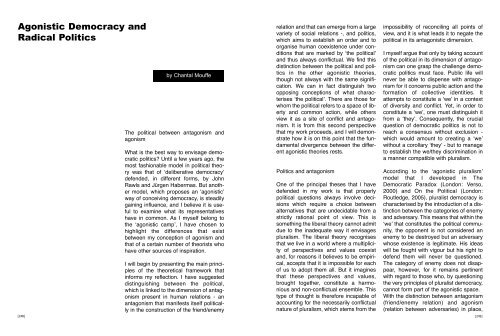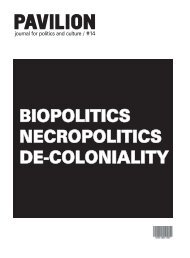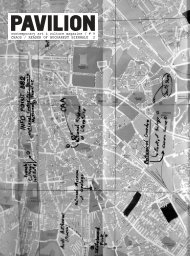PAVILION
PAVILION
PAVILION
- No tags were found...
You also want an ePaper? Increase the reach of your titles
YUMPU automatically turns print PDFs into web optimized ePapers that Google loves.
Agonistic Democracy and<br />
Radical Politics<br />
[248]<br />
by Chantal Mouffe<br />
The political between antagonism and<br />
agonism<br />
What is the best way to envisage democratic<br />
politics? Until a few years ago, the<br />
most fashionable model in political theory<br />
was that of ‘deliberative democracy’<br />
defended, in different forms, by John<br />
Rawls and Jürgen Habermas. But another<br />
model, which proposes an ‘agonistic’<br />
way of conceiving democracy, is steadily<br />
gaining influence, and I believe it is useful<br />
to examine what its representatives<br />
have in common. As I myself belong to<br />
the ‘agonistic camp’, I have chosen to<br />
highlight the differences that exist<br />
between my conception of agonism and<br />
that of a certain number of theorists who<br />
have other sources of inspiration.<br />
I will begin by presenting the main principles<br />
of the theoretical framework that<br />
informs my reflection. I have suggested<br />
distinguishing between the political,<br />
which is linked to the dimension of antagonism<br />
present in human relations - an<br />
antagonism that manifests itself politically<br />
in the construction of the friend/enemy<br />
relation and that can emerge from a large<br />
variety of social relations -, and politics,<br />
which aims to establish an order and to<br />
organise human coexistence under conditions<br />
that are marked by ‘the political’<br />
and thus always conflictual. We find this<br />
distinction between the political and politics<br />
in the other agonistic theories,<br />
though not always with the same signification.<br />
We can in fact distinguish two<br />
opposing conceptions of what characterises<br />
‘the political’. There are those for<br />
whom the political refers to a space of liberty<br />
and common action, while others<br />
view it as a site of conflict and antagonism.<br />
It is from this second perspective<br />
that my work proceeds, and I will demonstrate<br />
how it is on this point that the fundamental<br />
divergence between the different<br />
agonistic theories rests.<br />
Politics and antagonism<br />
One of the principal theses that I have<br />
defended in my work is that properly<br />
political questions always involve decisions<br />
which require a choice between<br />
alternatives that are undecidable from a<br />
strictly rational point of view. This is<br />
something the liberal theory cannot admit<br />
due to the inadequate way it envisages<br />
pluralism. The liberal theory recognises<br />
that we live in a world where a multiplicity<br />
of perspectives and values coexist<br />
and, for reasons it believes to be empirical,<br />
accepts that it is impossible for each<br />
of us to adopt them all. But it imagines<br />
that these perspectives and values,<br />
brought together, constitute a harmonious<br />
and non-conflictual ensemble. This<br />
type of thought is therefore incapable of<br />
accounting for the necessarily conflictual<br />
nature of pluralism, which stems from the<br />
impossibility of reconciling all points of<br />
view, and it is what leads it to negate the<br />
political in its antagonistic dimension.<br />
I myself argue that only by taking account<br />
of the political in its dimension of antagonism<br />
can one grasp the challenge democratic<br />
politics must face. Public life will<br />
never be able to dispense with antagonism<br />
for it concerns public action and the<br />
formation of collective identities. It<br />
attempts to constitute a ‘we’ in a context<br />
of diversity and conflict. Yet, in order to<br />
constitute a ‘we’, one must distinguish it<br />
from a ‘they’. Consequently, the crucial<br />
question of democratic politics is not to<br />
reach a consensus without exclusion -<br />
which would amount to creating a ‘we’<br />
without a corollary ‘they’ - but to manage<br />
to establish the we/they discrimination in<br />
a manner compatible with pluralism.<br />
According to the ‘agonistic pluralism’<br />
model that I developed in The<br />
Democratic Paradox (London: Verso,<br />
2000) and On the Political (London:<br />
Routledge, 2005), pluralist democracy is<br />
characterised by the introduction of a distinction<br />
between the categories of enemy<br />
and adversary. This means that within the<br />
‘we’ that constitutes the political community,<br />
the opponent is not considered an<br />
enemy to be destroyed but an adversary<br />
whose existence is legitimate. His ideas<br />
will be fought with vigour but his right to<br />
defend them will never be questioned.<br />
The category of enemy does not disappear,<br />
however, for it remains pertinent<br />
with regard to those who, by questioning<br />
the very principles of pluralist democracy,<br />
cannot form part of the agonistic space.<br />
With the distinction between antagonism<br />
(friend/enemy relation) and agonism<br />
(relation between adversaries) in place,<br />
[249]








